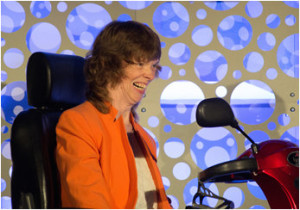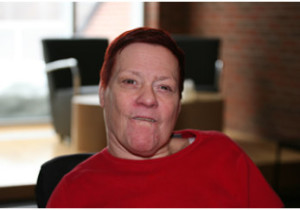Personal Stories
 My name is Glenda Watson Hyatt. I am a wife, an animal lover and a traveler. I am a published author, a motivational speaker and a social media maven.
My name is Glenda Watson Hyatt. I am a wife, an animal lover and a traveler. I am a published author, a motivational speaker and a social media maven.I have cerebral palsy, which affects my speech, balance and muscle coordination. My physical movements are jerky and involuntary; one body part or another is in constant motion. My left hand has some function, while my right hand is generally in a tightly clenched fist. I am not able to walk without support and my speech is difficult to understand.
My inability to walk independently is fairly easily accommodated with a small electric scooter for indoors, a large one for outside and a manual wheelchair for backup.
However, my speech impairment is far more disabling and isolating at times, and is more complex to accommodate, depending upon the situation. With family and close friends familiar with my unique speech pattern, I need to repeat only the occasional word to be understood when I am speaking. My speech disability disappears as I use the following tools for working and writing:
- Computer with webcam, speakers and headset
- Silicone keyboard
- Adapted joystick
- Wrist pad
- Sticky Keys (Keyboard accessibility feature available in Microsoft Office)
- WordQ (word prediction software)
- TextAloud (text-to-speech software)
- Various online communication tools (e.g., email, Facebook, Twitter, Skype)
It is when I am out and about that I run into barriers while attempting to communicate. Some people assume that I am cognitively or hearing impaired and they talk down to me, start gesturing or writing notes. Other people don’t even speak with me; they talk to someone else who may be with me or they even ignore me.
My communication access requirements for telephone and face-to-face interactions include:
- My voice
- Electric typewriter (for quick notes typed at home in advance)
- iPad Air
- Proloquo4Text app (text-to-speech app)
- Alphabet card (for low-tech back up)
- A trusted person to:
- make phone calls for me (e.g., to make hair and medical appointments)
- assist with phone calls when I am needed on the line for security reasons (e.g., to activate a new credit card)
- accompany me when communication is critical and when using my iPad might not be fast enough (e.g., appointment at the bank; medical appointments; trips to the ER)
Even with these communication tools and strategies in place, I still require accommodations from the person I am attempting to communicate with; after all, communication takes two. Regardless of whether I am patronizing a business, seeing my doctor or being treated in hospital, communicating at a public event or inquiring about my credit card over the phone, I require the following in order to effectively communicate:
- to be respected and acknowledged as competent and capable
- to be directly spoken to
- to be given time to convey my message using one of my methods, whether that is by using my voice, my iPad or having a trusted person translating what I am saying
- to be given extra time to allow for communication, which is especially important during any critical appointments (i.e., healthcare, legal and banking)
 My name is Nola Millan. I work as an online college instructor of basic psychology, as a web editor for ISAAC and I am a CDAC Ambassador. I have cerebral palsy that affects how I communicate. I use a wheelchair and have different ways to communicate. For me, access to my community is about people in businesses and organizations knowing how to interact with me and accommodate my accessibility requirements. In addition, I need the following supports, assistive technology and communication methods if I am to have equal access to my community.
My name is Nola Millan. I work as an online college instructor of basic psychology, as a web editor for ISAAC and I am a CDAC Ambassador. I have cerebral palsy that affects how I communicate. I use a wheelchair and have different ways to communicate. For me, access to my community is about people in businesses and organizations knowing how to interact with me and accommodate my accessibility requirements. In addition, I need the following supports, assistive technology and communication methods if I am to have equal access to my community.
- Assistance with personal services from attendants trained in how to communicate with me and how to set up my communication device
- Electric wheelchair for going to local stores
- Manual wheelchair for everything
- Seating services for seat and back cushions
For work, writing and connections
- Computer with speakers
- Keyguard
- Trackball
- Speaker phone
- Sticky Keys
- Zoom text with reader
- I work primarily from home. I get support from an employment support person around exam times. This person picks up the exams from college and reads them to me then returns them to the college. This person also accompanies me to any meetings or training sessions I need to attend.
Conversations
- My own voice
- Eco2 (speech generating device)
- Word board
- Human assistance when communicating in critical situations
Telephone
- Assistants (attendants / friends) speaking out what I am saying or pointing to on my board.
- Handsfree phone with large buttons. I dial it with my nose!
- Mobile phone – I use my speech generating device (ECO 2) to text to my cellphone.
- For telephone communication, I try to have as much of the information ready as I can. That way my communication assistant (attendant) is well prepared. Most places are fine about communicating with an assistant. I find financial institutes, such as credit card companies, are the worst. Due to their privacy policies they don’t understand the idea of an assistant and they won’t allow us to use a speaker-phone. Most of the time I’m forced to go into my bank and have them deal with things in person.
E-communications
- Email, Facebook, Skype, Google hangouts and Twitter
Communication Services
- Speech Language Pathologists who have training in AAC
- Technical support from AAC technologists
- Occupational therapists who have training in AAC
- Funding for face to face and written communication devices
Environmental Controls
- Door openers to my apartment that I can operate from my wheelchair.
- I turn on/off lights using regular light switches. My friend has rigged lamps to work with switches.
Alert call systems for emergencies
- I use Safe Guard. I wear a button on my wrist. When I press it, it alerts staff.
Accessible transportation
- I need accessible cabs and a reliable para-transit service.